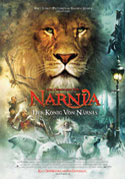

Opening 8 Dec 2005
Directed by:
Andrew Adamson
Writing credits:
C.S. Lewis, Ann Peacock, Andrew Adamson, Christopher Markus, Stephen McFeely
Principal actors:
Georgie Henley, William Moseley, Skandar Keynes, Anna Popplewell, Tilda Swinton
As with most classic children's literature, it is hard to find someone in my generation that hasn't at least heard of the seven Narnia books from C.S. Lewis. They were read aloud to me by my mother as a child, and the theory is that this is one series that should be read three times in life: as a child, a young adult, and a mature individual. Additionally, an intentional religious/Christian allegory is a strong part of the success of the novels for millions of its readers.
The director of Shrek, New Zealander Andrew Adamson, was awarded the honors of producing/directing/screenwriting The Chronicles of Narnia and turned to Richard Taylor's Weta Workshop (The Lord of the Rings trilogy) to bring the wildly imaginary creatures to life. Thus, my expectations for The Lion, The Witch and the Wardrobe were extremely high.
Narnia comes through on almost every level. It stays true to the book. It beautifully visualizes the creative Narnian world. The CGI work is seamless and the magical beasts are Weta-perfect (a tad "Orcan"). The battle scenes are appropriate for children in the sense that they are not gory, but successfully portray strong conflict. The cast was solid. With so much going for it, why did I find myself less-than-engaged in the story, the one sure thing?
When four siblings are evacuated from Blitzkrieg-ed WW2 London to the safer countryside estate of an old professor, they find a portal to an enchanted world through a storage wardrobe. Mr. Tumnus, the loveable faun the children first encounter (endearingly portrayed by James McAvoy), introduces us to the history of the 100-year freeze placed upon Narnia by the emotionless white witch, Jadis (wow to Tilda Swinton). The good "energy", in the form of Aslan the Lion (honey-voiced Liam Neeson), has been gone for years and Jadis rules the land with an underlying fear of an ancient prophecy predicting four humans breaking her ice spell and ruling Narnia as kings and queens.
This ensues the good vs. evil theme between Aslan and Jadis, played out through the personalities of the children. Since the first book was released in 1950, cinema has been tapping this vein in every fantastical way (Star Wars, LOTR, Harry Potter, etc.). After years of clipping action, the clean, beautiful Narnian world comes across so tame that it practically sleeps. Which is why this movie (Walt Disney Pictures) may be just the ticket for children but a flatline for adults who have been over-exposed to Luke, Frodo and Harry triumphing over sinister forces more ruthless than an selfish white witch with a fabulous costume designer.
My advice: read your children the book first, then see it on the big screen. (Kirstan Böttger)
Walt Disney Pictures and Walden Media bring us a delightful film version of the first book of C.S. Lewis' famous chronicles, directed by Shrek director Andrew Adamson. Adamson also co-wrote the screenplay with Ann Peacock, Christopher Markus and Stephen McFeely.
The Pevensie children, Peter (William Moseley), Susan (Anna Popplewell), Edmund (Skandar Keynes) and Lucy (Georgie Henley) have been sent to the home of Professor Kirke (Jim Broadbent) during World War II, to be safe from the Blitz. It is a rambling, stately house with large gardens and countless nooks, crannies and rooms to explore. One day, whilst playing hide and seek, Lucy climbs into a large old cupboard full of fur coats. As she pushes her way deeper in, she suddenly finds herself in a snow-covered forest, standing by a lamp post. This is where she meets Mr. Tumnus (James McAvoy), a faun, and learns that she has strayed into the magical world of Narnia, which is under the endless winter (without ever reaching Christmas) spell of the self-proclaimed queen, the White Witch Jadis (Tilda Swinton).
After a delightful tea with Mr. Tumnus, Lucy returns to her brothers and sister and is amazed to discover that no time has passed since she left. Unfortunately, her siblings do not believe a word of what she says; even Edmund, who also found his way into Narnia where he encountered the White Witch and tasted some of her delicious Turkish Delight, claims that Lucy is only pretending. One day, however, all four children are forced to use the cupboard to hide from the Professor's strict housekeeper, and then the adventure truly begins. Legend tells that Narnia will be freed from its endless winter when two sons of Adam and two daughters of Eve arrive to hail the return of the mighty lion Aslan (voice Liam Neeson) and overthrow the evil queen; yet Edmund has tasted the White Witch's Turkish Delight and convinces himself that she is good, while Aslan must be bad. He betrays his brother and sisters, setting the stage for tragic events that will lead to the need for an ultimate sacrifice...
Disney's The Lion, the Witch and the Wardrobe is a family movie which follows the original story very closely. The film is carried, on the one hand, by the well-rounded performances of the children. In particular, Georgie Henley as Lucy is a real discovery: her timing and expressiveness are spot on. On the other hand, the special effects, magical creatures, make-up and costumes courtesy of Sony Pictures Imagework, KNB EFX Group, Inc., and New Zealand's WETA Workshop, set an excellent balance with their creation of the magical world of Narnia. In spite of the hefty battle scenes (where I honestly did not notice the lack of blood!), it is a kid movie, though certain passages may be difficult for very sensitive children – unless they know the book and how it ends. (Osanna Vaughn)